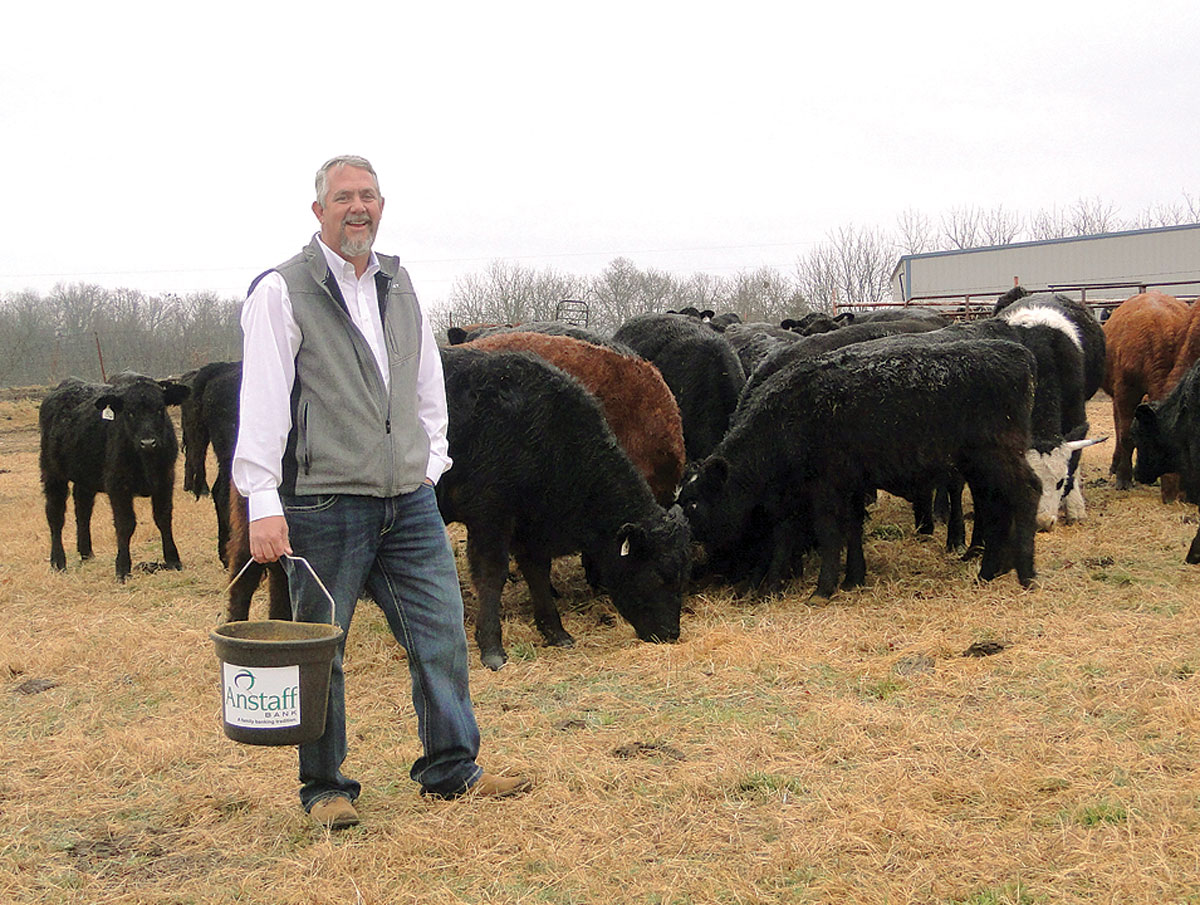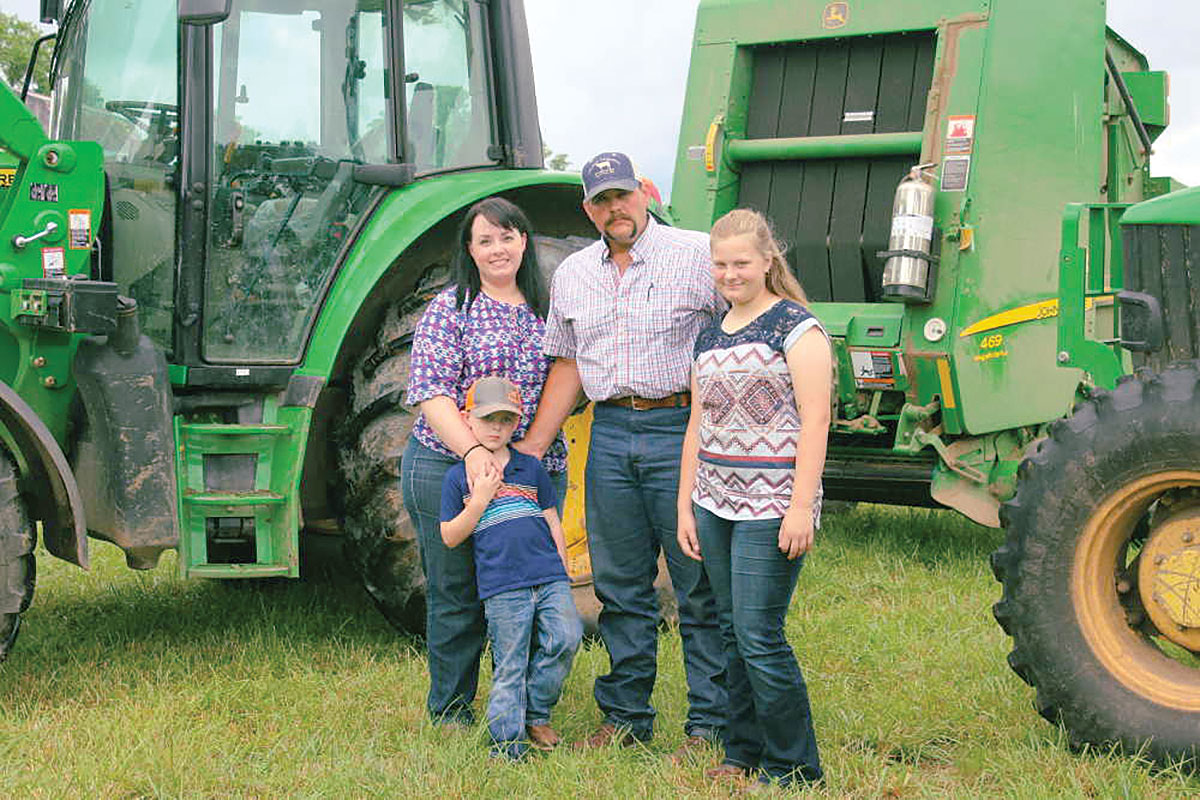
The Lewis family moves from cattle to sheep and goats
FAIRLAND, OKLA. – It was strictly a business decision. When Travis and Erica Lewis decided to make the change from ranching beef to sheep; it was all about the numbers.
“In 2015, cattle prices were high and we put figures to it, and with the steady price that lambs bring, we could make more off of sheep per acre than we could cattle,” Travis said. “So we sold out a cattle and got sheep.”
Almost a decade later the owners of T&E Farms, LLC have no regrets about diving headfirst into the sheep business. Their 36-acre ranch in Fairland, Okla., is now home to more than 75 sheep and goats and a growing herd in the middle of cattle country.
However, that doesn’t mean the transition was easy. They found out rather quickly there are major differences between the handling of sheep compared to cattle.
“Sheep are a lot more hands-on than cattle,” said Erica. “You have to trim hooves and they are much more prone to parasites than cattle are. If you see a cow that’s down, you have a little bit of time to figure out what’s going on. If you have a sheep that’s down, you either have to act fast and figure out the problem quickly to treat it or they’re going to die. Hair sheep are better than wool sheep, but there are still parasite issues that are much more difficult than cattle. But overall, the nutrition minerals are extremely important for sheep, having the correct mineral balance. So that was a big learning curve for us.”

Travis said he researched sheep for more than a year before T & E Farms went all in. After investigating all the possible options and what best suited their farm needs, he settled on Royal White Sheep to be their main focus.
“I liked the mother ability of them. I didn’t want a real tall ewe and I didn’t want a real short ewe,” Travis said. “They were about a medium size. I liked that about them. I just liked the personality, the demeanor. They are calm. They’re not real flighty to me. They were an all-around good pick. I don’t like the word parasite resistance. I just don’t know why animals are fully resistant, in my opinion. But they’ve got good qualities to combat the worm loads that we have in a humid state. Like we’re in Oklahoma, they handle the worm loads good. They had good twinning abilities. They’re just, to me, an all-around good ewe for what I wanted. I’ve seen a lot of good qualities in them that I liked.”
Yet, even after deciding that the Royal White was the direction they wanted to take the farm, they made the transition slow and methodical. They picked up a handful of ewe and ram to kick-start the operation.
“We started with just five because we didn’t know what we were getting into,” Erica said. “It was a good number to start with because when we increased our flock in 2017, I think we brought in an additional 20. We had worked out some the mineral and parasite kinks, and so it wasn’t quite as big of a shock when we brought in those extra use.”
Despite going through a big cull in 2023, T&E Farms has around 45 sheep on their property.

“Most of the sheep ewe lambs we’re able to sell is breeding stock or commercial breeding stock,” Travis said. “Our herd is a registered stock and most of the ewe can go for breeding. Now we keep a small percentage of rams that are good enough to go on as breeding rams. The rest have been going to the sale barn in the past, and we’re working on developing a meat market. This is our first year going to the farmer’s market with farm products. And so we’re working on developing that more.”
The Lewis family has the same type of diversification outlook when it comes to their goats as well. With more than 30 dairy and Kiko goats, they put in just as much work tending to them as they do the sheep.
“While we have an ongoing goal of regenerative grazing, we found that the sheep do not like many of the pasture’s weedy plants,” Erica stated. “With the goal of not spraying, Travis has had to diversify. He studied and researched for over a year before deciding on the type of goats he wanted to invest in. With an ongoing disdain for my dairy goats, he began to look into the meat goats as a diversified pasture maintenance crew. He finally found goats that fit his criteria from Pat and Donna Martens and Bill Francis in Oklahoma. These mix New Zealand Kikos, Pureblood/Fullblood Kikos, and some Savannah/Kiko crosses. These girls are entirely pasture-based. They are rotationally grazed with our ewe flock, have free choice minerals and a water wagon that moves with them every day.”
As far as Erica’s prized dairy goats, she has found a use for them and their milk as well.
“The dairy goats are my pet project and Travis doesn’t particularly care for them, but I’ve had them since 2010 and we raised our kids on goat milk because both of them were not so good on cow milk,” Erica said. “From there I made cheese and I can’t sell that at a farmer’s market. But due to the home baking act, we’ve been able to broaden our horizons a bit and the fudge and the candies, those are things that I can take to the farmer’s market to get our name out there and meet people and network.”
Travis and Erica do not run T&E Farms by themselves. Right beside them are their two children Holland, 10, and Hadessah, 8.
“The kids put a lot of hard work into this place,” Travis said. “Anytime we work, they’re there. They’re hands-on,” said Travis. “They add a lot to this. As they get on, the more they do and take on more jobs. I can’t say good enough things about them to what they’ve done.”
Both Erica and Travis want to continue to grow T&E Farms over the next five to 10 years. While Erica wants to feed as many people as they can, Travis believes they can handle a herd of 200 to 300, if not more.
“I don’t like sitting idle,” Travis said. “Idle is not a thing for us. We want to grow. We want to grow bigger. But again, I want to emphasize that I want quality, not quantity. That’s one of the reasons why it’s taken us so long to grow to what we are because we emphasize quality in our opinion and not quantity. I want something that somebody’s going to be able to buy out there and put out in the field, and it’s going to make them money. That’s what we strive for. Structure and good mothering ability. That’s what we want to send out there.”







